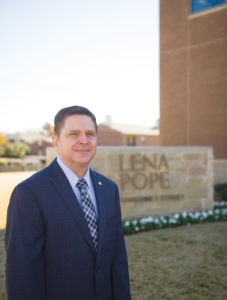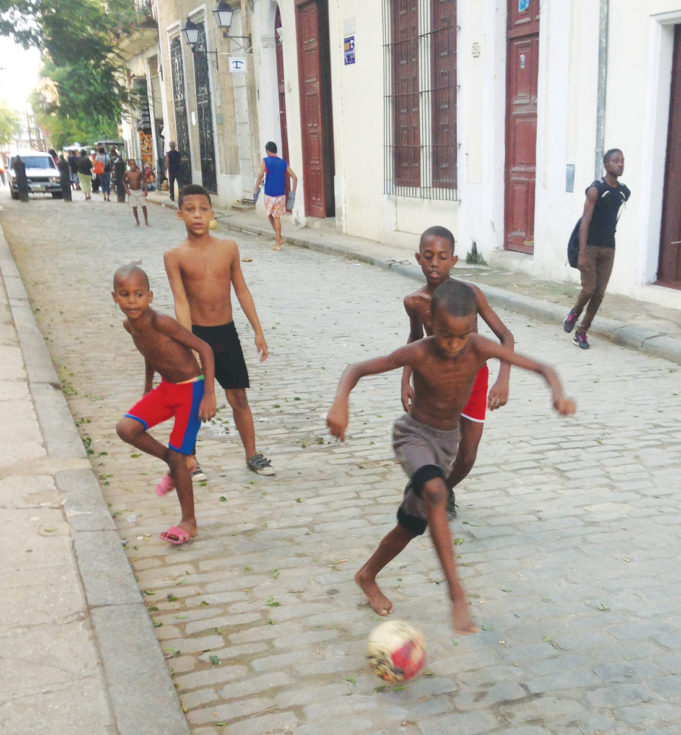In late September, 12 agency heads under the umbrella of the Child Welfare League of America took off to spend six days in Havana, Cuba, to learn how that country, under more than a 50-year embargo by the United States, dealt with child welfare issues.
Christine James-Brown, president and CEO of CWLA and one of the key creators of the trip, told the Fort Worth Weekly before departure that “prior to 1920, there was no formal child welfare system in the United States, and what’s intriguing to us, since Cuba has no formal child welfare system, will be jumping back to see what we can rediscover about how things were in those days. We’ll have a chance to see that in Cuba.”
Among the participants was Todd Landry, CWLA’s chairman of the board and CEO of Lena Pope, an 80-year-old Fort Worth nonprofit devoted to “creating hope, happiness, and success for children and families.”
“What I anticipated prior to the trip,” Landry told the Weekly, “based on what I’d read, was that we were primarily going to see a country and people that would be similar to other Latin American countries. What I actually saw was that while the landscape looks like a Caribbean country, the embargo has had a devastating impact on the country’s infrastructure. The physical buildings, their water and sanitation systems –– all of that has deteriorated because of the embargo. Visualize a country where no new construction has occurred in 50, 60 years.”
Landry explained that the physical deterioration was a result of not being able to get concrete onto the island and “a limit on how much they could produce themselves. They’ve been creative in patching things and making them work, but over time you can only do so much of that before the system fails.”
Despite having built their child welfare system in a nearly isolated state, Landry said, “in many cases the way their child welfare and early childhood schooling is handled is remarkably similar to what we’ve done in the States. And the quality of the care we saw was at least as good and in some cases considerably better than what is sometimes offered here in the U.S. They have a tremendous value for children and the communities.”
During their stay, members of the U.S. envoy had the opportunity to meet with government officials, visit with children and their caregivers in a children’s home, stop into a school and talk with students and teachers, and even meet with families in Havana.
“There was a good mix for learning about early childhood development and child welfare,” Landry said.
James-Brown told the Weekly that when CWLA was first established, there was no official child welfare system in the United States.
“At that time,” she said, “we too had a community-based system, but over the years, the formal child welfare system began to take the focus of the attention away from the community-based system. But you cannot solve children’s issues without that community element.”
And how did she think it was working?
“The kids were very well taken care of there,” James-Brown said. “And it wasn’t an act. The kids were happy and involved and friendly and curious and well cared for. There is clearly poverty, but the kids, for the most part, were in excellent shape.”
Another participant in the trip was Julie Springwater, executive director of the New England Association of Child Welfare Commissioners and Directors.
“What we saw the Cubans doing was working within their communities to find solutions for child welfare, rather than waiting for someone to come in and provide solutions for them,” she said. “For instance, I work with child welfare agencies in New England, agencies that work with children because of abuse or neglect in their families. And here we have people like social workers, doctors, nurses, police, and teachers who intervene if they suspect a child is being abused or neglected. In Havana, we were told that everyone is responsible to report abuse and neglect, not just professionals. That is a huge difference between their system and ours.”
Springwater said there was a big difference between the U.S. and Cuban systems for dealing with adoption and foster care as well.
“Kids in the same family in Cuba go to a group setting to keep them together when they are removed from a family,” she said. “They maintain that sense of belonging. We try to do that here as well, but I don’t know that we have the same success that they do.”
Springwater was impressed by other elements in the Cuban system: “There are doctors in every community, and they make house calls. We were in a hair salon one day when a doctor came in to see someone. That’s impressive. And a literacy campaign begun in the 1960s, where people went out to rural areas to teach people how to read and write, has produced a higher literacy rate than we have here in the United States. People seemed to eat well, they have a good lifespan, and everyone seemed very proud of their country and proud to offer a view of it to us,” she said.
Landry was also impressed by the medical services, not just for children, but for everyone: “They’ve got doctors in every neighborhood doing preventative care, which is great in the long run. Now part of that is necessity as they don’t have the resources to treat advanced diseases. But not as many diseases get advanced with the preventative care.”

What Landry saw was missing from the Cuban model of child welfare was some of the latest research: “There has been tremendous headway made in the area of childhood brain development, and that would be something we could share with them if we got to go back there. But I wouldn’t want to see their community-based system changed or lost. Optimally, I’d love to see them keep their system in place and then couple that with the latest research in some areas.”
The information gathered during the trip will be shared with others in the child welfare industry. “We’ve got plans to do three specific things with what we learned,” James-Brown said. “First, we will do some webinars with the members of our organizations and the organizations who were not able to participate in the trip. Then, we plan on doing a conference workshop, and, finally, some of us plan on writing about our experiences so that we can get the information out there.”
For her part, Stillwater said she enjoyed the trip and would gladly return: “I’d love to go back and learn more. In a week, you just skim the surface, and we spent our time in Havana. Next time I’d like to get out into the countryside.”
Landry also wants to go back: “I would love to return if the opportunity presented itself, but I think that will be heavily dependent on the respective governments’ positions as it relates to genuine normalization. That the political reality.”











